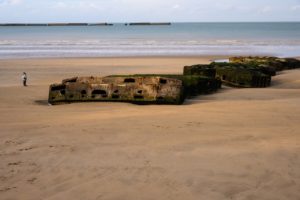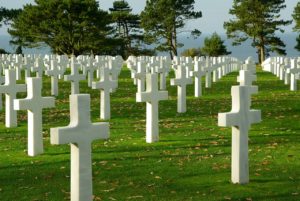D-Day in Caen
The D-Dayor D-Day, is one of the most significant events in modern history, and the city of Caen played a crucial role during this period of the Second World War. On June 6, 1944, Allied forces launched one of the largest military operations in history, the Normandy landings, with the aim of liberating Europe from Nazi occupation. Caen, as a strategic city, was at the heart of this titanic confrontation. This article explores the importance of D-Day in Caen, its impact on the city, and how the event is commemorated today.
The D-Day context: Why Caen was a key objective
Normandy: strategic terrain for the Allies
Normandy, with its accessible coastline and infrastructure, was a prime location for the Allies as they planned to liberate France from the Nazi yoke. The city of Caen, some 15 kilometers from the sea, was a strategic point, not only for its geographical importance, but also for its military infrastructure, such as the port of Caen and the roads leading to the heart of France. Liberating Caen meant cutting off some of the German forces’ armaments and supplies, while facilitating the advance of Allied troops inland.
Caen’s role in the Battle of Normandy
On June 6, 1944, the landing of Allied forces on the beaches of Normandy marked the beginning of the liberation of France. However, Caen was not liberated on the same day. Because of its strategic position and strong German resistance, the city was the scene of fierce fighting for several weeks. It was only on July 21, 1944, after heavy fighting, that Caen was liberated by Canadian and British troops. The “Battle of Caen” made the city a symbol of the fight for freedom in Europe.
The Battle of Caen: An intense and destructive battle
Allied bombing raids
Before attacking the city directly, the Allies stepped up their air strikes and bombing raids to destroy the German military infrastructure and prepare the ground. On June 8, 1944, just two days after D-Day, Allied bombers destroyed much of Caen’s city center, causing countless casualties among the civilian population. These attacks left deep scars on the city and contributed to the slow advance of the Allied forces.
German resistance: A city in Nazi hands
Caen was occupied by German forces, and the city was heavily fortified, with bunkers and points of resistance. German soldiers offered fierce resistance, making the liberation of Caen particularly difficult. The battle intensified, and the terrain was devastated, with heavy casualties on both sides. The city was liberated after weeks of fierce fighting, but the damage was considerable.
The impact of D-Day and the Battle of Caen
Massive destruction in Caen
As a result of bombing and street fighting, Caen was almost completely destroyed. The city center, in particular, was devastated, and many infrastructures, including historic buildings, were reduced to rubble. The city took years to rebuild after the war. Today, some districts and buildings still bear the scars of this tragic period.
Human losses and sacrifices
Human losses during the Battle of Caen were heavy. In addition to Allied and German soldiers, the civilian population paid a heavy price. Thousands of civilians lost their lives during this period, and tens of thousands were forced to flee their towns for their lives.
escape the fighting. Caen, like other towns in Normandy, had to rebuild both materially and psychologically.
The D-Day Commemoration in Caen
The Caen Memorial: A place of remembrance not to be missed
Today, Caen is home to an essential site for the memory of the Second World War: the Mémorial de Caen. This museum, inaugurated in 1988, is dedicated to the history of D-Day and the memory of the war’s victims. It offers an overview of the events of D-Day, as well as the context of the Second World War and its consequences. The Memorial is a place of reflection, remembrance and education, attracting visitors from all over the world every year.
The military cemetery of the Battle of Caen
The military cemetery of the Battle of Caen is also a major place of remembrance. It contains the graves of Canadian, British and German soldiers, as well as those of civilians killed in the fighting. The cemetery is a place of remembrance for those who wish to pay tribute to those who gave their lives for the liberation of France.
D-Day ceremonies in Caen
Every year, D-Day commemoration ceremonies are held in the city, notably on June 6. These events attract large numbers of veterans, soldiers’ families and the general public. Parades, official speeches and moments of silence pay tribute to the sacrifices made. Caen, like the D-Day landing beaches, is a place where collective memory lives on, and where future generations can learn about the importance of this historic event.
The D-Day in Caen in popular culture
Caen and the D-Day in film and literature
D-Day and the Battle of Caen have also been widely represented in popular culture, notably in film and literature. Films such as “The Longest Day” and “Saving Private Ryan” have paid tribute to the events of the D-Day and brought the importance of Normandy in the history of the Second World War to the attention of the general public. Books and documentaries also recount the events of Caen and the Liberation, helping to keep the memory alive.
the memory of this key moment in history.
The impact on future generations
D-Day in Caen remains a reference point for collective memory. Future generations, through visits to the Caen Memorial, ceremonies and events, continue to discover the history of the Second World War. This process of transmission is essential if we are to avoid forgetting and honor the sacrifices of previous generations.
Why visit Caen to understand D-Day?
A journey through time
Caen is a veritable open-air museum for those wishing to understand the scale of the events of June 6, 1944. The city allows visitors to relive the history of the Second World War through historic sites, museums and monuments dedicated to the memory of combatants and civilians. A trip to Caen is an immersion in one of the most decisive moments in contemporary history.
A place for tourism and reflection
In addition to its rich history, Caen is also a dynamic and pleasant city to visit. The city’s combination of historical heritage and modern ambience makes Caen an ideal destination for history buffs, but also for those looking for a complete tourist experience. By visiting the commemorative sites, visitors can also reflect on the importance of peace and freedom in today’s world.
Caen, witness and actor of the D-Day
D-Day in Caen represents a fundamental moment in the history of the Second World War, and a turning point for freedom in Europe. The city, with its poignant memories and places of remembrance, continues to play a central role in preserving this memory. As a witness to and a major player in D-Day, Caen remains an essential site for all those wishing to understand the historical and human stakes of this great world event. The commemoration of D-Day in Caen is much more than a tribute, it is a celebration of freedom and unity, essential for future generations.
Practical information:
81st anniversary of D-Day
When? May 31 to June 16, 2025
Le Clos Saint-Martin: Your haven of peace at the heart of the D-Day commemorations
A holiday steeped in history
Caen, martyred city and symbol of the Resistance, attracts thousands of visitors every year during the D-Day commemorations. If you’re looking for a unique and authentic experience, Le Clos Saint-Martin is the ideal address for your stay.
Why choose Clos Saint-Martin?
A privileged location: Located in the heart of Caen, close to major sites of remembrance such as the Caen Memorial and the D-Day landing beaches, Le Clos Saint-Martin offers easy access to all the must-see sites.
A peaceful, historic setting: This charming guest house, housed in a former 16th-century mansion, transports you to another era. Its interior garden offers a haven of peace where you can recharge your batteries after a day of sightseeing.
Modern comforts: Despite its historic character, Le Clos Saint-Martin offers all the modern comforts you need for a pleasant stay: spacious rooms, quality bedding, free Wi-Fi connection…
A gourmet breakfast: Every morning, you’ll be served a hearty, varied breakfast featuring fresh, local produce.
The advantages of staying at Le Clos Saint-Martin during D-Day
Total immersion in history: Staying at Le Clos Saint-Martin means immersing yourself in the history of Caen and the D-Day. You can visit places of remembrance, take part in ceremonies and understand the importance of this event.
An ideal starting point for your visits: Le Clos Saint-Martin is located close to public transport, making it easy to get around Caen and the surrounding area.
A moment of relaxation: After an eventful day, relax in the Le Clos Saint-Martin garden and enjoy the peace and quiet.
A unique experience: When you choose Le Clos Saint-Martin, you’re opting for an authentic, unforgettable experience.
Book your stay at Clos Saint-Martin!



